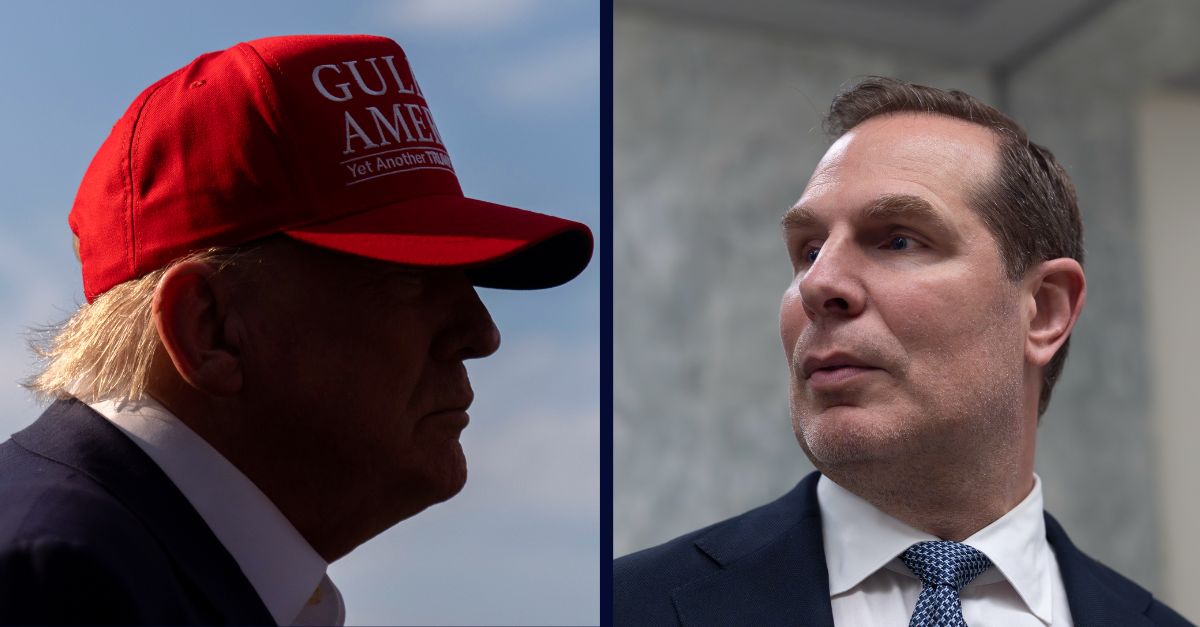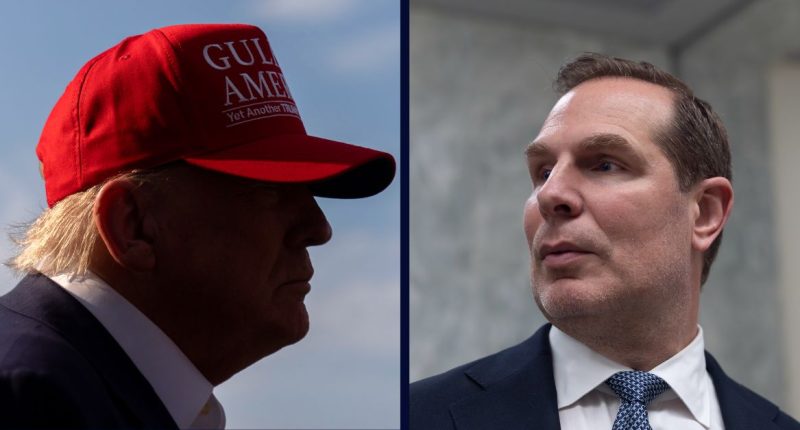
Left: President Donald Trump speaks to the media before walking across the South Lawn of the White House to board Marine One en route to Joint Base Andrews, Md., and on to Florida, Tuesday, July 1, 2025, in Washington (AP Photo/Mark Schiefelbein). Right: Pete Marocco, a political appointee focused on gutting USAID, departs after briefing the House Foreign Affairs Committee behind closed doors, on Capitol Hill in Washington, Wednesday, March 5, 2025 (AP Photo/J. Scott Applewhite).
A federal judge in Washington, D.C., ruled Tuesday that President Donald Trump”s appointment of a lone board member at an agency he gutted with the help of the Department of Government Efficiency (DOGE) was “likely illegal.”
Senior U.S. District Judge Richard Leon, a George W. Bush appointee, wrote that Pete Marocco, who was not confirmed to his post by the U.S. Senate, likely “does not have the legal authority” to serve as the acting head of the U.S. African Development Foundation (USADF).
The judge sided instead with plaintiff Rural Development Innovations Limited (RDI), a Zambian consulting firm and USADF grantee that “offers technical support to small businesses including women-and youth-led enterprises” and whose very “existence is threatened” by the sweeping agency cuts.
As Law&Crime reported in March, RDI and two USADF employees filed suit in federal court after DOGE employees and Marocco, known for his role in dismantling the U.S. Agency for International Development, moved to shut down the agency as much as the law allowed and proceeded to nuke the near entirety of its contracts and grants.
After Trump’s executive order to cut the USADF’s “performance of their statutory functions and associated personnel to the minimum presence and function required by law,” the USADF’s Senate-confirmed board members and its president were fired, and Marocco stepped in as acting chair of the board and then appointed himself as president of the agency, the complaint detailed at length:
On February 21, President Trump issued an Executive Order describing USADF as “unnecessary” and directing that the agency be reduced to its minimum statutory functions. The Trump Administration then purported to appoint Pete Marocco as the “Acting Chair” of USADF. In that capacity, Marocco purported to hold a meeting of the Board of Directors. He was the only participant in that meeting, at which he purported to appoint himself the President of USADF.
Marocco then claimed to exercise the powers of the Board of Directors and of the President of USADF by terminating almost all of the agency’s grants and contracts, by terminating the employment of almost all of the agency’s staff, and by rendering it impossible for the agency’s remaining staff to communicate with its few remaining contractors and grantees. In sum, Marocco has destroyed the ability of USADF to perform its congressionally assigned mission.
Leon agreed on Tuesday that the RDI not only showed the court has jurisdiction, but also that Marocco’s appointment was “likely unlawful” without Senate confirmation.
In a footnote, the judge reiterated that plaintiffs have “shown a likelihood of success in showing that Marocco does not have legal authority to serve at USADF[.]”
Love true crime? Sign up for our newsletter, The Law&Crime Docket, to get the latest real-life crime stories delivered right to your inbox.
Calling the Trump administration’s arguments that the court lacked jurisdiction “futile,” Leon wrote that the Constitution “likely does not vest the President with the authority to appoint Marocco as an acting Board member at USADF” without the advice and consent of the Senate.
The judge took a dim view of the administration’s assertion that Trump could work around the Appointments Clause with his “inherent Article II authority to appoint” Marocco as “acting principal officer” of USADF. Leon noted that conservative judges on the U.S. Court of Appeals for the District of Columbia Circuit have “cast serious doubt on this argument.”
The judges Leon cited were U.S. Circuit Judges Gregory Katsas and Neomi Rao, both Trump appointees.
“In sum, it is unlikely that the President has the authority to appoint Marocco as an acting Board member at USADF. While defendants argue that the President has inherent Article II power to appoint acting principal officers, there is little hope for defendants that this argument will win the day,” Leon concluded. “The Court therefore finds that plaintiffs are likely to succeed on the merits of their challenge to the legality of Marocco’s appointment.”
Moreover, the judge said that RDI had “shown irreparable harm,” since it “receives all its funding from USADF, and the firm is unable to meet its financial obligations absent funding from USADF.”
The judge then issued a preliminary injunction in RDI’s favor, applying it to Marocco and named defendants “who are carrying out his directives.”







